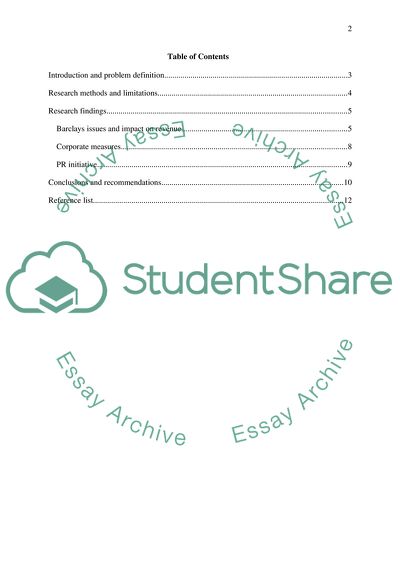Cite this document
(“Ethical Issues of Barclays Essay Example | Topics and Well Written Essays - 3000 words”, n.d.)
Ethical Issues of Barclays Essay Example | Topics and Well Written Essays - 3000 words. Retrieved from https://studentshare.org/marketing/1666374-identify-a-corporate-situation-in-an-existing-financial-service-company-in-the-uk-that-could-disturb-you-as-a-manager-evaluate-the-situation-and-use-marketing-research-methodologies-to-find-solutions-to-the-problems-faced-by-you-prepare-a-report-that
Ethical Issues of Barclays Essay Example | Topics and Well Written Essays - 3000 words. Retrieved from https://studentshare.org/marketing/1666374-identify-a-corporate-situation-in-an-existing-financial-service-company-in-the-uk-that-could-disturb-you-as-a-manager-evaluate-the-situation-and-use-marketing-research-methodologies-to-find-solutions-to-the-problems-faced-by-you-prepare-a-report-that
(Ethical Issues of Barclays Essay Example | Topics and Well Written Essays - 3000 Words)
Ethical Issues of Barclays Essay Example | Topics and Well Written Essays - 3000 Words. https://studentshare.org/marketing/1666374-identify-a-corporate-situation-in-an-existing-financial-service-company-in-the-uk-that-could-disturb-you-as-a-manager-evaluate-the-situation-and-use-marketing-research-methodologies-to-find-solutions-to-the-problems-faced-by-you-prepare-a-report-that.
Ethical Issues of Barclays Essay Example | Topics and Well Written Essays - 3000 Words. https://studentshare.org/marketing/1666374-identify-a-corporate-situation-in-an-existing-financial-service-company-in-the-uk-that-could-disturb-you-as-a-manager-evaluate-the-situation-and-use-marketing-research-methodologies-to-find-solutions-to-the-problems-faced-by-you-prepare-a-report-that.
“Ethical Issues of Barclays Essay Example | Topics and Well Written Essays - 3000 Words”, n.d. https://studentshare.org/marketing/1666374-identify-a-corporate-situation-in-an-existing-financial-service-company-in-the-uk-that-could-disturb-you-as-a-manager-evaluate-the-situation-and-use-marketing-research-methodologies-to-find-solutions-to-the-problems-faced-by-you-prepare-a-report-that.


